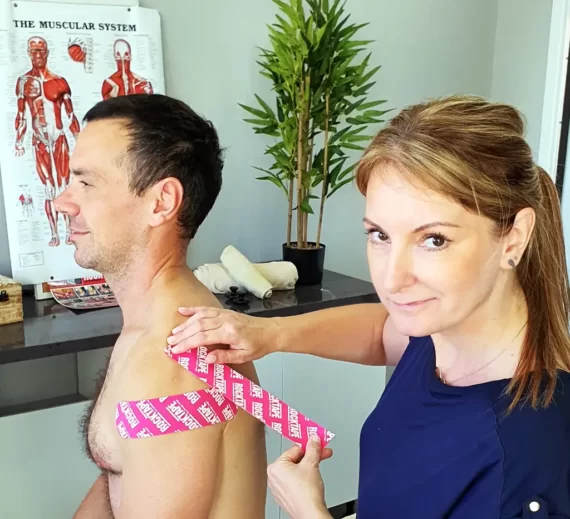At some point in our lives, we have all experienced pain, discomfort or stiffness in our muscles, whether it is from a sudden injury, overuse or even just poor posture. This is where taping and remedial massage therapy come in, two forms of therapy that can help alleviate these types of issues. In this article, we will provide you with everything you need to know about these two therapies.
What is Taping Therapy?
Taping therapy, also known as kinesiology taping, is a technique that uses an elastic tape to support and stabilize muscles and joints. The tape is applied to the affected area to improve circulation, reduce pain and inflammation, and enhance range of motion. Taping can be used to treat a range of conditions, such as sports injuries, sprains, strains, and postural problems.
The Benefits of Taping Therapy
There are numerous benefits to taping therapy. First, it can reduce pain and inflammation, allowing the affected area to heal faster. It can also help support and stabilize the affected area, preventing further injury. Additionally, taping therapy can improve circulation and promote lymphatic drainage, which can help reduce swelling and promote healing.
How is Taping Therapy Applied?
Taping therapy is applied by a trained therapist who will assess the affected area and determine the best taping technique to use. The tape is cut to size and applied to the skin, over and around the affected area. The therapist will then rub the tape to activate the adhesive and ensure it is securely in place. Taping therapy can be worn for several days, even during exercise and other physical activities.
What is Remedial Massage Therapy?
Remedial massage therapy is a form of deep tissue massage that focuses on treating musculoskeletal issues, such as pain, stiffness, and tension in the muscles, tendons, and ligaments. The aim of this therapy is to restore the body’s natural balance, alleviate pain, and promote healing.
The Benefits of Remedial Massage Therapy
There are numerous benefits to remedial massage therapy. First, it can help reduce pain, stiffness, and tension in the muscles, allowing for greater range of motion and improved flexibility. Additionally, it can improve circulation and promote lymphatic drainage, which can help reduce inflammation and promote healing. Remedial massage therapy can also help reduce stress and anxiety, as well as improve sleep.
How is Remedial Massage Therapy Applied?
Remedial massage therapy is applied by a trained therapist who will assess the affected area and determine the best massage techniques to use. The therapist will use deep tissue massage, trigger point therapy, and other techniques to target the affected muscles, tendons, and ligaments. The pressure applied during the massage can be adjusted to suit the individual’s needs and preferences. The duration of the massage can range from 30 minutes to an hour or more.
Which Therapy is Right for You?
Both taping and remedial massage therapy can be effective in treating musculoskeletal issues, but which therapy is right for you will depend on your individual needs and preferences. Taping therapy may be more suitable for acute injuries, such as sprains and strains, as it can provide immediate support and stability. Remedial massage therapy may be more suitable for chronic issues, such as muscle tension and stiffness, as it can target deeper tissues and provide long-lasting relief.
In conclusion, taping and remedial massage therapy are two effective forms of therapy that can help alleviate pain, reduce inflammation, and promote healing. If you are experiencing musculoskeletal issues, it is important to seek the advice of a trained therapist who can assess your condition and determine the best course of treatment for you.
10 commonly asked questions and answers about taping and remedial massage therapy:
- What is taping?
Taping is a method of supporting the muscles and joints using adhesive tape to help with pain, inflammation, and support. It is commonly used by athletes and people who are recovering from injuries. - What is remedial massage therapy?
Remedial massage therapy is a form of massage that focuses on treating musculoskeletal pain, injuries and other conditions using various massage techniques, including deep tissue massage, trigger point therapy, and myofascial release. - What conditions can taping and remedial massage therapy help with?
Taping and remedial massage therapy can help with a variety of conditions, including back pain, neck pain, shoulder pain, knee pain, sports injuries, arthritis, and more. - Is taping or remedial massage therapy painful?
Taping should not be painful, but some people may experience discomfort or irritation from the tape. Remedial massage therapy can sometimes be uncomfortable, especially when deep tissue massage is used, but it should not be painful. - Can taping and remedial massage therapy be used together?
Yes, taping and remedial massage therapy can be used together to help alleviate pain, inflammation, and support the muscles and joints. - How often should I receive remedial massage therapy?
The frequency of remedial massage therapy will depend on your individual needs and the severity of your condition. Your therapist may recommend weekly, bi-weekly, or monthly sessions. - How long does a remedial massage therapy session last?
The length of a remedial massage therapy session can vary, but typically lasts between 60 and 90 minutes. - How long should I wear tape for?
The length of time you should wear tape will depend on your individual needs and the severity of your condition. Your therapist may recommend wearing the tape for a few hours to a few days. - Can I apply tape myself or should I see a professional?
While it is possible to apply tape yourself, it is recommended to see a professional to ensure that the tape is applied correctly and effectively. - Are there any side effects to taping and remedial massage therapy?
While taping and remedial massage therapy are generally safe, some people may experience side effects such as skin irritation or soreness after the treatment. It is important to discuss any concerns with your therapist before receiving treatment.






